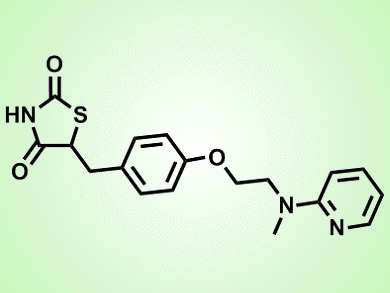Cerebral malaria is the most severe form of malaria, an infectious disease caused by the parasite Plasmodium falciparum, and is lethal in most cases. Moreover, in surviving patients, it causes long-lasting cognitive and neurological disabilities, such as epilepsy and learning disorders.
Kevin C. Kain, University Health Network (UHN), Toronto, Canada, and co-workers discovered that rogislitazone (pictured), a drug already approved for the treatment of diabetes, prevents the neurological impairment associated with cerebral malaria. By using a mouse model of this disease, the researchers demonstrated that when rogislitazone is administered together with anti-malaric compounds, it prevents the development of brain abnormalities. As a consequence, rogislitazone improved the survival of mice affected by cerebral malaria and protected them from neurological impairment.
Rogislitazone may thus be a valuable tool to prevent and treat cerebral malaria.
- PPARγ Agonists Improve Survival and Neurocognitive Outcomes in Experimental Cerebral Malaria and Induce Neuroprotective Pathways in Human Malaria,
Eleanor M. Riley, Lena Serghides, Chloe R. McDonald, Ziyue Lu, Miriam Friedel, Cheryl Cui, Keith T. Ho, Howard T. J. Mount, John G. Sled, Kevin C. Kain,
PLoS Pathog. 2014, 10, e1003980.
DOI: 10.1371/journal.ppat.1003980




